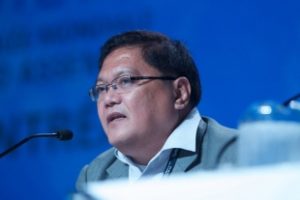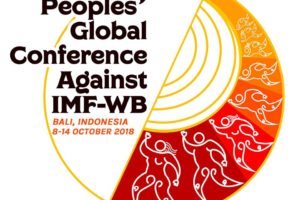IBON International stands in solidarity with our Philippine CSO partners, Paghida-et sa Kauswagan Development Group (PDG), and the Leyte Centre for Development (LCDe), who are falsely accused of “terrorist financing” charges. We join calls to drop the false charges against PDG and the LCDe, and decry the instrumentalisation of counterterrorism laws to harm local civil society organisations (CSOs) and development workers. We assert the important role of local CSOs in the delivery of services, and realising people’s right to development.
Five members of PDG, a local CSO in Kabankalan, Negros Occidental province, face false charges of violation of Republic Act No. 10168, a counterterrorism financing law. Former PDG Executive Director Clarissa Ramos is among these five individuals. Her husband, human rights lawyer and PDG member Benjamin Ramos, was murdered by unidentified assailants in November 2018. She has sought asylum in Europe, and has been working on raising international solidarity and support for Philippine issues with the International Coalition for Human Rights in the Philippines-Europe (ICHRP-EU).
IBON International has undertaken research together with PDG about the implementation of the World Bank-funded Support for Parcelisation of Land Individual Titling (SPLIT) Project and its risks to peasants’ right to land and civil-political rights. Since its establishment in 1987, PDG has supported peasants’ rights and struggles, including resistance against the Bank’s SPLIT Project.
Meanwhile, the bank accounts of LCDe, and the personal bank accounts of its Executive Director Jazmin Aguisanda Jerusalem, have been frozen for alleged violation of the same law. Jerusalem is a member of the Board of Trustees of the Council for People’s Development and Governance (CPDG), a civil society platform of 60 development organisations co-hosted by IBON International.
The LCDe has been distinguished for its disaster response, such as during the devastation of Typhoon Haiyan in 2013. It has been awarded by the government, including the National Anti-Poverty Commission in 2023, and the Department of National Defense in 2006, as well as by international organisations. In 2021, Jerusalem was the recipient of the United Nations Women’s International Network on Disaster Risk Reduction (WIN DRR) leadership award for Asia-Pacific.
Since the enactment of the 2020 Anti-Terrorism Act, counterterrorism financing laws have been increasingly used to repress activists and their organisations, including Indigenous Peoples’ activists of the Cordillera People’s Alliance, the Rural Missionaries of the Philippines, the Community Empowerment Resource Network (CERNET), and Amihan, a peasant women’s organisation.
Such counterterrorism laws align with the US “War on Terror” that has killed and displaced millions, such as in Afghanistan, Pakistan, Iraq, Syria, Libya, Yemen, Somalia and the Philippines. “Terrorist” rhetoric is also used to vilify the Palestinian people’s struggle for liberation against the US-backed Israel occupation and genocide, and peoples expressing solidarity with their struggle.
The “global counterterrorism architecture” includes the Financial Action Task Force (FATF), an intergovernmental organisation founded by the Group of Seven (G-7) countries (US, European Union, United Kingdom, Canada, France, Germany, Italy, and Japan). A negative assessment by the FATF marks a country as “a risk to the international financial system” and means “higher interest rates and processing fees” and “more scrutiny from financial institutions.”
In the Philippines, an attached conditionality to a 2021 World Bank loan to the Philippines has required strengthening the Anti-Money Laundering and Counterterrorism Financing framework and implementing key recommendations of the FATF. Pro-business policy reforms and measures promoted by the World Bank and the FATF are viciously enforced by the state, and weaponised against activists asserting land rights and sovereignty against resource extractive projects.
We assert that the US counterterrorism agenda should be scrutinised and exposed for facilitating war crimes and rights violations, and for perpetuating a political culture that vilifies civil society, people’s organisations, and social movements for rights and liberation. The current attacks against local CSOs coincides with the prolonged detention of six youth activists who were brutally arrested during labour day protests at the US Embassy in Manila, Philippines. Social movements have called out the influence of US policies – on counterinsurgency, counterterrorism, and increasing militarist interventionism in the Asia-Pacific – over rights violations and repression. Currently, the US and the Philippines are holding their largest joint military exercises between April 22 to May 10. #




